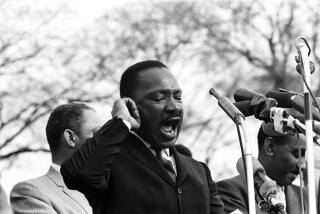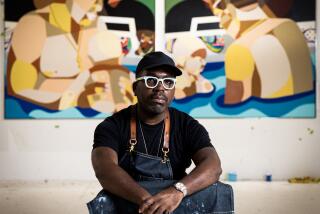Young Egypt musician’s songs struck revolutionary chord
Reporting from Cairo — The song just came to him. Boiling with anger on that first day of February after Egyptian President Hosni Mubarak refused to step down, Ramy Essam grabbed his guitar.
Within 20 minutes, he banged out lyrics cobbled together from the chants of the crowd in Tahrir Square, and then climbed a wobbly stage.
“All of us are standing together, asking for one simple thing: Leave, leave, leave, leave,” he sang, in a hypnotic echo of the words that had ricocheted through the square all day. “He will leave, because we won’t leave.”
He called it “Leave,” and the song captured the mood of the twentysomething Egyptian youths who were pushing the boundaries and shaking up society in a way they never dreamed possible.
Just 10 days after Essam wrote his galvanizing song, Mubarak was gone and Essam believed the world belonged to the young.
He couldn’t imagine ever going back to his life before the revolution, when he was just a kid whose mom thought he played the guitar too much. The revolution, and the song it inspired, had put him in a place where his dreams and reality were one.
Now Essam has a Facebook fan page, with 2,000 members, and a newly posted video of another of his songs, “Revolution,” the simple accompaniment of acoustic guitar and crowd chants of “Leave!” replaced by lush studio trappings.
He always imagined he would discover fame as a musician by the time he was 30. Instead, he had done it at 23 over the course of three weeks in Tahrir Square.
“I don’t think I’ll ever be so happy again,” he said.
*
In the square, the nights and songs bled together. Essam ate there, slept there, sang there, fought police and pro-Mubarak demonstrators there.
He would bang on his guitar, waiting in a streetlamp’s spotlight while demonstrators strung a power cable to their speakers so he could perform on the makeshift stage.
Sure, other singers would perform, but Essam was the one who spoke to the protesters about what they were feeling at that instant: revolution.
The singer, well over 6 feet tall with the build of a bouncer, would study the warm-up act: a small guy on the shoulders of a friend shouting free-form verse dissing Mubarak’s regime.
“Ramy! Ramy!” a few men would start shouting.
With a crowd of mostly young men, children, a few shy girls wearing head scarves, Essam would strum the opening chords, and the audience of a hundred would double in size. They would give a roar of recognition. He would grin and flash them a thumbs up.
Teenage boys with long hair would start to wave and clap their hands high in the air.
As smoke lifted from cigarettes, Essam would lower his eyes and launch into a song: “Keep your head down, keep your head down.”
They would roar back sarcastically the next line: “You are in a democratic country. You are enjoying freedom.”
Nothing would ever be the same.
Everyone in Tahrir will remember those nights of banging chords and booming choruses, to vaguely flamenco-sounding guitar, all of them singing together about peace and freedom, their clapping hands forming the backbeat.
In the years to come, those nights may appear like the dawning of a glorious age, or come to haunt them with memories of what could have been.
On those nights they swayed arm in arm and filmed each other on cellphones as Essam banged out pseudo-reggae chords and strung the words together like a dancehall toaster.
“Get out, get out, Hosni Mubarak.”
“Leave, leave,” they sang back.
The song was so catchy that even a listener who looked to be a plainclothes security man let out a giggle when he inadvertently sang the words.
On Mubarak’s last night in power, after he had delivered a speech in which he again refused to go, the crowd begged Essam to sing, to keep their spirits up.
In his little warren of tents, he practiced his songs and wrote new ones about revolution. He strummed while his friends chattered and smoked, oblivious to him.
Essam had started playing at home when he was 15, and he began writing songs because he didn’t know anyone who expressed how he felt.
He always knew he wanted to be a musician. But his mother, who had to be both parents after his father died, insisted that he finish school.
In the square, his older brother, Shadi, dressed in a checkered keffiyah and jeans, would listen to the melodies. Ramy considered Shadi his confidant. Sometimes Shadi suggested topics for songs, including one Ramy finished in the square and that they named “The Decision,” about how people have to stand up if they’re being oppressed.
“I never thought the revolution would happen. Now revolution is here, and people are singing his songs,” Shadi said one day during the protests.
The brothers had watched the unfolding demonstrations in Tahrir on satellite television and heeded the protests’ Pied Piper call. Ramy left behind his life as an engineering student for “the center of the revolution.”
“Someday Ramy will be a big artist and star and I’ll be a politician, so we can change our country,” Shadi said, slinging his arm around his brother.
Even their mother has at last given her blessing to Ramy’s music.
When he walked through the packed square as the days wore on, his head and shoulders above most others like a big tree in a forest, teenagers would shake his hand. He had become a bit of a celebrity, with young men asking to have their picture taken with him.
One song that he relished, and that late at night the crowd would want to hear again and again, was an ode written by well-known poet Ahmed Fouad Negm: “The Donkey and the Foal,” which everyone knew to be a commentary on Mubarak and his son Gamal.
Essam had written the music and played it for himself alone at home before the revolution. And now everyone shouted for the scathing lyrics of the aging poet, who had been jailed under Mubarak’s predecessor. He felt honored when the poet stood with him and recited the words.
The foal said to the donkey, “Father, hand me the cart. Father, you have aged and now it is my turn.”
The donkey coughed too strongly and the passengers panicked.
“It isn’t about health, son,” the donkey said. “ Even the bridle is too big for you, son. Think and don’t be greedy, or the passengers will rise up.”
Soon, the days in Tahrir were over. But Essam vowed with friends to come back every Jan. 25 to stay awake all night and sing with them.
“I am from the people and will stay with the people,” he declared.
He had surpassed his wildest dreams.
If he was nervous about his future, he didn’t let on. Mubarak was gone and fame was beckoning.
Times staff writer Parker was recently on assignment in Cairo. Al Zohairy is a special correspondent..
More to Read
Sign up for Essential California
The most important California stories and recommendations in your inbox every morning.
You may occasionally receive promotional content from the Los Angeles Times.










